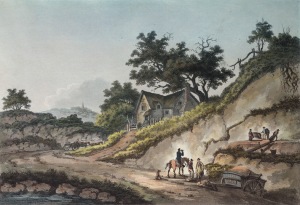In 1805, John William Cunningham had the great fortune of marrying Sophia Williams, youngest daughter of a wealthy Hertfordshire merchant. She gave him nine children and her papa bought him the living of Harrow-on-the-Hill. As vicar, he could leave many duties to his curate, and concentrate on his Calling–sermonizing.

Sophia’s father owned Moor Park. Photographed by Nigel Cox, Creative Commons Attribution Share-alike license 2.0
Unfortunately, there was only so much sermonizing the people in the village could take.
To reach the faithful beyond Harrow-on-the-Hill, John was determined to publish a book of sermons. However, he must have realized his potential readers, like the villagers, might be put off by his message. He decided to put forth his evangelizing effort in the guise of a Novel. His publisher, the venerable Hatchards, evidently approved.
John wrote his novel after the fashion of a work he much admired, The Story of La Roche, which follows the travels of a Christian philosopher and his beautiful daughter, Madamoiselle La Roche. It was a French tale serialized in The Mirror (not the current tabloid, but a late eighteenth century magazine out of Edinburgh). Incidentally, the editor warned the readers of the Mirror in the preface to La Roche that the work had a religious theme.
Inspired, John dashed off A World Without Souls. In it, a young man, Gustavus, leaves his home and the girl he is much attached to and travels abroad (to a place very like Regency England) in the company of a wise mentor. They come to a place resembling Hyde Park where the ladies and gentlemen are in full promenade on Sunday:
“But have they no veneration for the Sabbath?”
“Yes..the females do their utmost..by enforcing servants and horses upon unnecessary employments, to defraud two beasts of their lawful rest, and shut out two souls from heaven.”
Souls was well-received by some, but excoriated by others. Not because it was religious in nature, but that it sought to fool the reader into thinking it was a novel. And one should never try to fool the Regency reader:
“We cannot say that such flimzy disguises altogether please our taste. They remind us of a coarse and clumsy deception well known to and put into practice by Essex shepherds. When an ewe has lost a lamb by premature death, these men strip the fleece off the carcase, and fasten it on the young of some other ewe, in order to induce the mourner to suckle the substitute.
With the silly animal the imposture succeeds. Not so does it fare with man. We detect, we smile, we contempt, we are disgusted.”
— The Gentleman’s Magazine and Historical Chronicle (1813)
John was completely unapologetic. Even in the epilogue of his novel, he disparages the notion his young male character be reunited with his love:
“If I marry Gustavus and Emily, it will be objected to me, that it is incredible a tale of truth like mine should terminate like a novel (!)”


He wouldn’t be a romance writer in today’s world for many reasons. The hero and heroine are doomed never to be together. For shame!
LikeLike
yes, he was evidently very naughty–thanks for reading!
LikeLike
The preacher’s book sure doesn’t sound like much fun to read. Trying to disguise sermons in a novel is like trying to make the proverbial silk purse from a sow’s ear. Not very smart.
LikeLike
I totally agree–the reviewer thought he must be dicked in the nob to think the readers would be fooled. Thanks for coming by!
LikeLike
Sounds like Emily, fictional or not, had a narrow escape!
LikeLike
Yes we need that HEA, Shame on him! Tweeted
LikeLike
I agree without reservation. Glad you could stop by!
LikeLike
I don’t know why people were complaining. Pilgrim’s Progress has been read for several hndred years. Very definitely a sermon in the guise of a novel.
Richardson’s Sir Charles Grandison as another book more sermon than novel and Hannah More’s Coelebs in Search of a Wife definitely was. Her Cheap Repository tracts were sermons in the guise of short stories.
LikeLike
My speculation: a jumped up vicar from little Harrow on the Hill, purchased by his wife’s money, now thinks he can pursue the art of novel-writing and make it whore for his primary occupation. Hannah More always got a pass (except from a select few other female writers) because she modeling appropriate behavior for females. I’ll have to look at the critical reviews of the others you’ve mentioned.
Always nice to have you come by, Nancy.
LikeLike
Great post! And I hate to say it, but there are a number of books being published today, vaunted as great literature when what they actually are is sermons to the righteousness of one lifestyle or another, one political view or another, or one celebrity or another.
At least with romance you know what you are getting from the start and there is a great deal of comfort in this swiftly changing world in something you can depend on to deliver exactly what you need on a bad day.
LikeLike
what Louisa said….
LikeLike
Great post! Little has changed in publishing. Many of the novels published today with the big budgets sermonize about certain lifestyles, politics and celebrities as if they are religions and need to be crammed down our throats. At least with romance a readers knows what he or she is getting and knows the writer will deliver what they need most in a swiftly changing world – something to believe in.
LikeLike
you said it, Sister.
LikeLike
have you looked at what constitutes romance lately? Some don’t even have a HEA. How can Shapeshifter have a HEA with a mere mortal? I read a romance the other day in which at the last minute the supposed heroine– the one the hero spent the whole novel saving, decided she needed to go off t0 find herself. That was how the first book ended. The second book had a friend gradually weaning the hero away from the woman finding herself towards her.
Or a so called romance in which a couple who survived all sorts of problems and dangers in the previous book are no longer a couple– usually one of them has died and the second book has the survivor going through h–ll with a child and finding a new love.
Not my idea of romance. Love Story isn’t my idea of a romance either.
There are many novels out there. Not all are real romances.
LikeLike
“needed to go off t0 find herself”
Well, you got me there. I’m laughing myself into stitches.
“Love Story isn’t my idea of a romance either.”
You just made my evening, Nancy.
LikeLike
I love how he was called out in such a public fashion! Good for them! Tweeted and shared on FB.
LikeLike